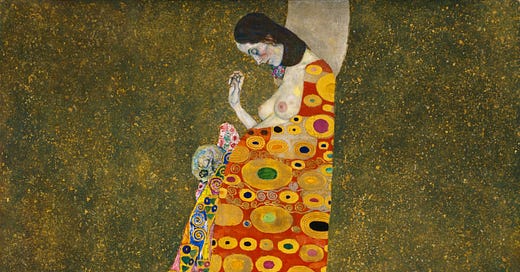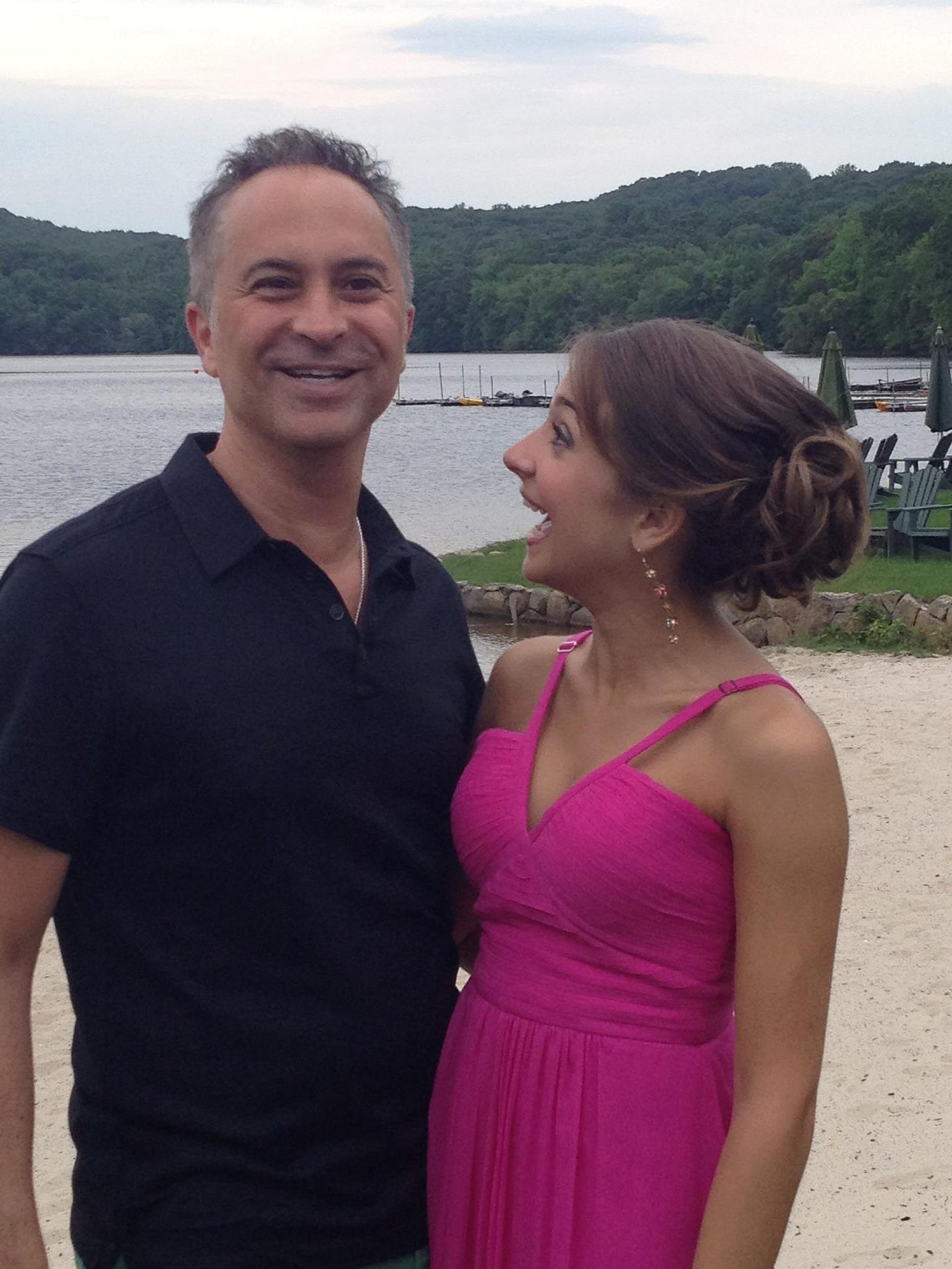In and Out of Control
On wrestling with hormonal birth control and psychiatric medication in the age of MAHA
Six months ago, I started adding a pastel yellow pill to my morning routine, which, besides walking my dog, is not much of a routine at all. Before that, I hadn’t been on hormonal birth control for almost two years. Deciding to start the birth control pill again was, in many ways, an obvious choice, or at least it should have been: I didn’t want to get pregnant. The pill is a cheap, easy, and effective way to 93% ensure that doesn’t happen.
But I waffled over whether to get back on birth control for months. I’d gone off it in 2023, when I was twenty-eight. I didn’t want kids then, either, but I had reached an age where friends and friends-of-friends were starting to get pregnant—and more often than I expected, struggling to. At my annual exam, I asked my gynecologist how I could find out whether I might face fertility issues down the line, and she told me I wouldn’t know until I tried. But the best predictor for not having any issues was having a regular menstrual cycle.
I had no idea if I had a regular cycle. The pill had been regulating it for almost the entirety of my twenties, and that gave me a sudden, uncanny feeling of disconnect from my body. I had to know. When my next pack of pills ended, I didn’t start the next one.
I’m not the only woman who has wrestled with whether to be on the pill or not, particularly in the last decade. For my generation of millennials, it feels like every woman I know is either on the pill or has been on it, whether to prevent pregnancy, improve acne, or mitigate symptoms of illnesses like polycystic ovarian syndrome (PCOS) or endometriosis. But the range of potential side effects can be just as vast as the solutions the pill offers, from decreased libido to depression to the rare possibility of blood clots. And in the post-Dobbs era, the stakes of an unintended pregnancy make decisions about birth control even more loaded.
Roe v. Wade had been overturned for a year when I stopped taking the pill. I was living in Tennessee at the time, well-aware that I could afford to test out being off birth control in a way that many women in my state could not. I wanted to be smart about it. After my doctor’s appointment, I did some googling, and it took no time for my Instagram feed to start featuring doctors espousing the benefits of being off the pill and balancing your hormones naturally. The content expanded as I clicked: naturopathic doctors turned to wellness influencers turned to Bachelor-nation contestants promoting cycle-tracking apps.
Even though my initial motivation for stopping the pill was to find out whether my cycle was regular, I was influenced by what I found on social media—or better yet, by the social media that found me. As Lauren Weber and Sabrina Malhi reported in The Washington Post, social media algorithms are biased to proliferate negative stories, and repeat them. That’s how my feeds became inundated with recipes for hormone-balancing brownies and retellings of pill-induced suicidal urges. I’m an investigator-turned-journalist, and still, I found myself more and more uncertain about whether I should have ever trusted the pill.
But it wasn’t just the post-Dobbs explosion of questionable online content that made me skeptical. It started when I was a teenager and went on birth control for the very first time. I was seventeen and thunderous, at once both bursting and contained. At the time, my parents were in the middle of a long, thorny divorce after my father came out as gay. My then-boyfriend cooked me linguine one night and told me I disgusted him the next. My college plans involved moving from New Jersey, where even the houses stumbled over one another, to California, where every road and possibility was vast.
I had the feeling of sliding down the deck of a boat, reaching for the railing but unable to grasp it. A year after starting the pill, I went to a therapist, then a psychiatrist. I first tried a couple of selective serotonin reuptake inhibitors (SSRIs) that didn’t seem to make much difference, then a mood stabilizer called lamotrigine (the generic version of Lamictal) that did.
I was taking the same birth control and the same lamotrigine dose two years later, when, soon into my sophomore year of college, the roiling came back. Again, I grasped. My roommate walked me to the campus mental health center, where the psychiatrist on-call told me something I’d never heard before: my birth control was making my lamotrigine half as effective, and therefore, I should start doubling my dose.
I listened to her, and at first I didn’t notice a difference. But within a few days, the pieces of my body decided to detach themselves one by one. My feet stumbled beneath unpredictable ankles. My eyes floated in their jelly sockets. My tongue filled the entirety of my mouth, my throat; fuzzy and unwelcome.
I hated the feeling; I was afraid of it. I didn’t know what was what, so I stopped everything. No more lamotrigine, no more birth control. My body sweated and trembled as it stitched itself back together. An angry, dizzying panic followed me for days, even when I spent most of them in bed.
When I emerged, something childlike within me had crumbled, an implicit trust I lost. I learned my way out of it, as I always do when I’m outraged. I found that there is a link between hormonal birth control and depressive symptoms, especially among adolescents. I did this initial rage-research ten years ago, but today the impact of hormonal birth control on mood remains the most ambiguous of all purported side effects. In The New Yorker, Margaret Talbot demonstrated that studies have been contradictory: some found the pill increased the likelihood of depression, while another study demonstrated no increased likelihood, and yet another showed a decreased likelihood of depression.
Talbot wrote, “Since all these studies were observational—not randomized with control groups—it’s impossible to say whether there might be reasons other than the pill itself that young women taking it (the relationships they might be in, for example) are more likely to be depressed.” Talbot’s story was published six months ago, but she sums up exactly how I felt at nineteen: that it was impossible to say.
I didn’t know whether the pill had instigated an imbalance that led to my lamotrigine prescription, or whether all of it cartwheeled back to the turbulent circumstances of my life at the time, or whether I was just a normal teenager ricocheting into young adulthood. I did know that I felt blinded. Each doctor along the way had not given me enough information. It seemed impossible that for years, none of my doctors had mentioned an interaction between my two medications that was the first result in my Google search for “Lamictal + birth control.” I didn’t know what I should have been asking. The experience left me feeling like no one had been paying attention.
“The reality is that many people are pursuing answers in a system rife with implicit biases against women’s health concerns and a history of prioritizing reproductive ability over personal preferences,” Sarah Sloat writes in WIRED. “...there’s a clear disparity between the information people want and the information they’re given.” Hormonal birth control is an unsatisfying option for many women, Sloat points out, and that’s not the fault of influencers.
But the conflation of historic biases against women, a medical culture that does not prioritize patients’ concerns, and a rising mistrust of science creates a hotbed for this sort of populist, internet-driven approach to health information. When people feel abandoned by professionals, they seek information from one another. A stranger on Reddit or Instagram can seem more trustworthy than your doctor of six years when that stranger has lived the same harm, anxieties, and questions as you. And these peers, anonymous in their digital distance, also become aspirational: look how happy and healthy you can be, too, they say.
Laura Delano is that beacon at the head of a parallel movement: getting off psychiatric medication. I first came across Delano’s story in a long-form New Yorker profile about her. Starting with a bipolar diagnosis when she was a teenager, Delano went through years of intensive medication regimes, hospitalizations, and what are called prescription cascades—one drug causes a side effect, which requires another drug. Many diagnoses and prescriptions later, she spent a harrowing six months tapering off all of them. Which is to say, she spent months in withdrawal.
Afterwards, Delano started a blog describing her experience. People began contacting her and asking for her advice. Her blog turned into a private coaching business, as well as a nonprofit. In the days before TikTok, Facebook groups and online forums made up the foundation of another version of peer-to-peer support, for a group who couldn’t find the answers they needed from doctors.
Delano’s story was familiar to me, a bit because of my lamotrigine experience, but more so because I grew up in a home where my father very openly talked about his mental illness and reliance on medication. He was on the same constellation of drugs for more than ten years. They were instrumental in his stability. In 2017, he worked with his therapist and psychiatrist to begin tapering off some and try out others, after wondering whether the ones he’d been on had lost their efficacy or dulled him in some way. At the time he changed his medications, he was also navigating an onslaught of stress—a major surgery after a burst appendix, a painful break-up, a legal mess with my mother. Within six months, he died by suicide.
I don’t blame his medication, or the change in them, for my father’s death, but until he died, I’d had some naiveté that psych meds, though imperfect, were an iron wall against mental illness’s most extreme consequences. And though that’s not true for suicide, for other serious conditions it is. For example, medication is the only evidence-based treatment for schizophrenia.
That doesn’t mean there aren’t real issues with the frequency and duration of how psych meds are prescribed. Today, Delano and her Inner Compass Initiative are vocal advocates of the “de-prescribing” movement, which envisions a network of withdrawal support similar to Alcoholics Anonymous. But like the negativity bias on social media, Inner Compass Initiative’s online resources skew negative at best, misleading at worst. At the same time, the medical community is recognizing and vocalizing the need for research, guidelines, and conversations about when and how to taper patients off psychiatric meds.
The most dangerous part of withdrawing without professional support is that withdrawal symptoms and relapse symptoms can look so similar. But as Dr. Awais Aftab wrote last month in The New York Times, there is “not a single high-quality randomized controlled trial that can guide clinicians in safely tapering patients off antidepressants.”
People look for support from those with experience, like Delano, rather than their doctors for the same reason people search “birth control side effects” on TikTok before they ask their gynecologist: mistrust coupled with a sincere hope for solutions. And there is an information gap, not just in what doctors share with patients but also in what research exists in the first place: there is also no high-quality randomized controlled trial on the effect of birth control on depression.
Within this gap rise figures like Robert F. Kennedy, our health and human services secretary, who has claimed (falsely) that SSRIs have contributed to school shootings. A few weeks ago, the White House released the Make America Healthy Again report, which recommended further research into the long-term effects of SSRIs. In January, contraception guidelines temporarily disappeared from the CDC website after President Trump’s executive orders rolled back protections for transgender people (the information is back up, but remains under review and modification). The aftermath of the Dobbs decision and consequent state-level abortion bans have reduced the number of birth control prescriptions being filled, likely because many reproductive health clinics have needed to close. DC-area doctors have reported that more of their patients seeking abortions are there because of going off hormonal birth control based on misinformation they found online.
“In the MAHA era, it will be even more algorithmically seductive and politically convenient for many people, both Trump supporters and those who might be influenced by them, to place faith in the purity of wellness coaches and supplements over the expertise of doctors and F.D.A.-approved medications,” Talbot wrote in The New Yorker about hormonal birth control, but the same could be said about psychiatric medication.
There are valid issues with hormonal birth control, and there are valid issues with psychiatric medication—especially when it comes to under-researched effects of long-term use, and whether both medications are overprescribed in response to circumstances that should be addressed more at their root causes (this goes for how often birth control pills are described to treat other issues, not in the context of preventing pregnancy). But the MAHA movement and Trump’s broader agenda have taken advantage of real patient concerns and mistrust.
Take Sabrina Grimaldi, who wrote about her experience rushing to the emergency room after a blood clot started turning her leg purple and swollen. At the hospital, she learned she had two pulmonary embolisms. She was on the birth control pill and had a history of blood clots in her family.
“Yes, there is misinformation online, and I would never condone turning to social media for medical advice. But where are we supposed to turn? When doctors wouldn't take me seriously, where else was I to go? When the doctors you’re supposed to trust don't listen to you or give you the information you need, what are we to do?” Grimaldi wrote in the essay, which was published in Evie, a politically conservative women’s magazine.
Reading through Evie’s archive about birth control and going down a TikTok rabbit hole, I found plenty of alarm bells like influencers promoting natural supplements or cycle-tracking apps backed by Peter Thiel. But I also found countless stories like Grimaldi’s, of women sharing vulnerable experiences in a search for information and validation.
In The New York Times, Ellen Barry covered a similar phenomenon on the Surviving Antidepressants forum, where users watch videos of Laura Delano on a loop—for information, and for hope.
The messaging around both movements—getting off the pill and getting off psych meds—is that these are drugs that have taken control of something fundamental in those who take them, and getting off them means getting that control back. It suggests a version of freedom that is hyper-individualistic, isolating even within our own bodies. But it is still a valid, human, sometimes-desperate fear that underlies this medication skepticism.
It is ironic that, fundamentally, access to birth control and psychiatric medication is the actual freedom. Freedom to make decisions about when and with whom to have children. Freedom to live less burdened by the symptoms of mental illness. They are not drugs that keep us alive in the same way drugs for high cholesterol and high blood pressure do—although psych meds can certainly be life-saving, as they were for my father for many years. But in general, what both classes of drugs do is give those who take them more agency over their lives.
I know firsthand that a bad experience with any drug can have the opposite effect: when I took too much lamotrigine and then went through a few days of withdrawal, I felt like I had no control. I did not want to touch hormonal birth control for years, and even though I haven’t had any negative reactions to the pill since, the skepticism still lingers. It was there as I watched TikToks of similar stories that validated the experience I had. It was there as I hesitated to start the pill again this winter. It is here as I consider another decision: whether to try medication for the insomnia that has oscillated between a nuisance and a debilitation over the last two years.
The idea of relying on any drug still strikes stubbornness and fear, and something unreasonably Puritan inside me, even as digging into questions around birth control and psych meds has made me far more aware of the information, both valid and not, that influences me. Because whether we are seeking it from a drug or off a drug, the desire to feel in control of, connected to, and at ease within our own bodies and our own minds is an essential, universal one.
Connecting with others does bring us ease, and there is a lot of value in sharing stories about our health and medical experiences, whether online or with friends, that for many years have been taboo to discuss. I wouldn’t have known to ask my gynecologist about fertility if I hadn’t heard vulnerable stories from friends about their own fertility journeys. I wouldn’t have known how helpful psych meds can be if my father wasn’t so open about his experiences.
But thoughtful research is essential when it comes to making any of these decisions. When you come across a supplement or a product or an organization, look up who funds them. Learn to get comfortable with source documents. You don’t need to be a scientist to learn the basic principles of randomized controlled versus observational studies. Look up credentials. Be cautious of what you read in books—almost no publisher pays for fact-checking, and fact-checking is the responsibility of the author. Depending on the outlet, articles are more often thoroughly fact-checked than nonfiction books. Click the citation links! Be even more cautious of what you learn via LLMs: they hallucinate data and research that doesn’t exist.
Don’t research to become an expert, but research to ask the questions you actually want answered by an expert. Generate questions, not conclusions. Practice the difference between seeking certainty and seeking information.
Going off and back on the pill didn’t turn me into a doctor, and it didn’t dramatically change my life. But it did give me information about my body. It led me to get curious about an important conversation in culture, and in medicine. Whether I go on medication for insomnia or not, I know I can learn something both from peers who also wake up wired at 3am, and from professionals who have been treating insomnia for years. I know that I can access information, and there are few feelings I find more freeing than that.












wow I'm awkwardly early but this all resonated so much with me. My book club read a whole book (This is Your Brain on Birth Control, by Dr. Sarah Hill) and, despite citing many studies and explaining things in layman's terms, my friends and I concluded that when it comes to hormonal birth control, "it depends." There's just so much unknown, and I turn to Reddit and TikTok so often--in addition to asking my doctors (but appointments are hard to get and you're right, I often trust others' personal experiences more than a doctor's seemingly quick checklist). Thank you for writing this!!
This resonates so much with me, Sophia, especially those moments when something unexpected happens and you later find out that you weren’t given all the information you needed from your doctor. I was recently diagnosed late with hypermobility spectrum disorder (HSD) after switching doctors - and most of the minor-to-major health problems I’ve had over the years align with that diagnosis. Why was that never caught by my other doctors? I feel like I’m playing catchup now, trying to piece together my own medical history. I’m checking my bloodwork reports now and learning to ask for certain tests. But I wish I didn’t feel like I needed to. That trust I used to have that my doctors would alert me to anything problematic has been shaken, and I’m figuring out how to research without convincing myself I’ve got cancer every five minutes. Your advice is so sound, though. Great article and I feel seen ❤️